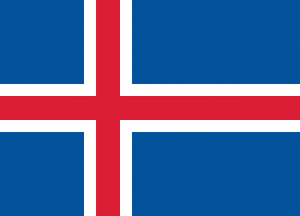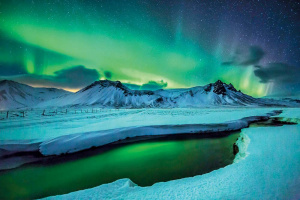Language/Icelandic
Hi Polyglots! 😃
Welcome to the Icelandic learning page!
You will find below many free resources to learn and practice this language.
Enjoy your learning journey with Polyglot Club! 😊
Facts about Icelandic[edit | edit source]
- Language code (ISO 639-3):
isl - Autonyms (how to write "Icelandic" in Icelandic):
Íslenska - Other names for "Icelandic":
Íslenska - The Icelandic language is spoken in:
Iceland
Icelandic is a North Germanic language spoken by about 314,000 people, the vast majority of whom live in Iceland where it is the national language.As a West Scandinavian language, it is most closely related to Faroese, extinct Norn, and western Norwegian dialects.
The language is more conservative than most other Germanic languages. While most of them have greatly reduced levels of inflection (particularly noun declension), Icelandic retains a four-case synthetic grammar (comparable to German, though considerably more conservative and synthetic) and is distinguished by a wide assortment of irregular declensions. Since the written language has not changed much, Icelanders can read classic Old Norse literature created in the 10th through 13th centuries (such as the Eddas and sagas) with relative ease.
Source: https://en.wikipedia.org/wiki/Icelandic_language
Icelandic Dictionaries[edit | edit source]
• Concise Icelandic-English dictionary by Sverrir Hólmarsson, Christopher Sanders, John Tucker (1989) (University of Wisconsin)
• Snara: English-Icelandic dictionary & other languages
• Íslensk-katalónsk orðabók: Icelandic-Catalan dictionary, by Macià Riutort
• Íslenzk-Ensk orðabók: Icelandic-English dictionary by Geir Zoëga (1922)
• Islandsk-dansk ordbog: Icelandic-Danish dictionary by Sigfús Blöndal (1920) I - II (from leggja)
• 50 easy proverbs for Icelandic learners selected from Íslenskir málshættir með skýringum og dæmum, by Sölvi Sveinsson (1995)
• Concise dictionary of Old Icelandic by Geir Zoëga (1910) (or scanned book)
• Icelandic-English dictionary by Richard Cleasby & Gudbrand Vigfusson (1874) (or scanned book)
• Árni Magnússon Institute: Icelandic-Basque glossaries, manuscripts (17th)
• Icelandic first names: origin & meaning
• Icelandic-English glossary of selected geoscience terms
• On loanwords of Latin origin in contemporary Icelandic by Matteo Tarsi, in Nordicum-Mediterraneum (2014)
• On the origin of the oldest borrowed Christian terminology in Icelandic (10th-12th centuries), in Orð og tunga (2016)
• The vocabulary of insular Scandinavian: lexical purism, neologisms and language contact in Icelandic and Faroese, by Edward Smith (2014)
Free Icelandic Lessons[edit | edit source]
Language Exchange[edit | edit source]
Forum[edit | edit source]
Tools[edit | edit source]
Marketplace[edit | edit source]
Last Lessons[edit | edit source]
Days of the Week — How to Use Have — How to Use Be — How to say Good Bye? — Health — Express Surprise — Geography — Gender — Fruits — Feelings and Emotions — Education — Drinks — Clothes — Negation — Plurals — Conditional Mood — Food — Iceland Timeline — Literature and Arts — Religion — Economy — Government — History — Climate — Geography — Names — People — Dress Code and Age Limit for Partying — Useful vocabulary for Partying — The best nightlife spots in Reykjavík


